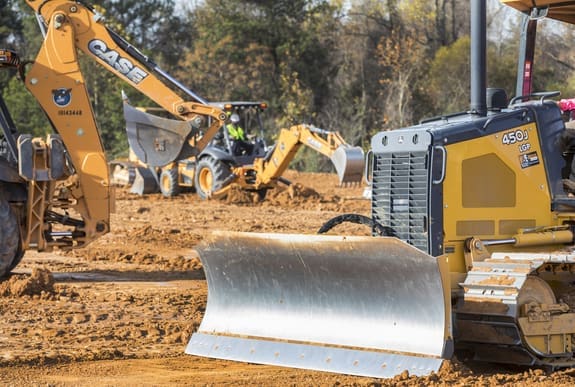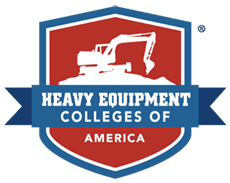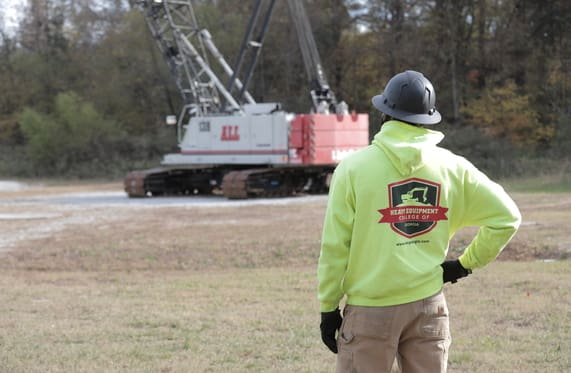Working in a construction site can be a dangerous task for those involved. Mishaps can cause serious bodily injuries. That’s why it’s vital to follow standard safety checklist before, during and after operating heavy equipment on the job site. This checklist can help you do your part as a heavy equipment operator in minimizing injuries in the construction site. Heavy equipment safety is of the utmost importance.
Construction Site Safety Checklist:
1. Follow OSHA guidelines
The Occupational Safety and Health Administration (OSHA) has guidelines in place to help minimize and prevent workplace injuries. These include rules for heavy equipment operators as well as ground workers’ safety measures. Be sure to read up and stay current with the new regulations, as they update and change. Some of the more common causes of construction site injuries and deaths, such as falling, are closely related to violations of OSHA codes.
2. Pre-operation inspection
Conducting pre-operation inspection of heavy equipment is one of the most important steps to preventing construction site injuries. A thorough walk around the outside of the heavy equipment can help you catch any issues with the equipment before you ever hop in the cab. After you do that, you’ll also want to inspect the inside of the cab prior to firing up the heavy equipment for work. Maintenance checks help ensure you’re not using faulty heavy equipment.
3. Inspect the work site
Just as you inspect the heavy equipment prior to getting started, it’s just as critical that you do a thorough inspection of the construction site. Take note of the environmental conditions, as some weather can make it dangerous to operate certain equipment. You’ll want to be aware of electrical wires, trenches and other potential hazards as well. If possible, it’s a good idea to remove obstacles from the site. Safe surroundings go a long way in minimizing injuries.

4. Training sessions
Training doesn’t stop after you finish a heavy equipment operator training program. Safety training and other training sessions are a regular part of a heavy equipment operator’s job. They help everyone stay current on safe work practices pertaining to heavy equipment operation and any changes that are made to OSHA guidelines. A refresher course also never hurt anyone, and it may make the difference in a workplace accident being avoided.
5. Use the right equipment
An easy way to avoid construction site catastrophes is to make sure you’re using the heavy equipment that is right for the job. Be sure to pay attention to payload and lift capacities. Using equipment that isn’t strong enough can have serious consequences for you as an operator and those in the surrounding area.
6. PPE
Wearing the right equipment in a construction site can sometimes make a big difference in the severity of injuries suffered on the job. Personal protective equipment (PPE) includes apparel such as hard hats, work boots, gloves and protective eyewear. OSHA has guidelines about PPE that you should read up on, too.

7. Education
Above all, the best way to mount a defense against construction site injuries is to learn heavy equipment operation safety procedures the right way the first time. As noted in the training session section, heavy equipment operators continue learning throughout their careers. Heavy equipment operator training programs help students like you build the foundation upon which continuous learning is done. This is especially important as safety is concerned.
Are you ready to learn the ropes of heavy equipment operation and master the techniques needed to minimize construction injuries? If the answer is yes, there’s no better place to start your education than Heavy Equipment Colleges of America.
Safety first at HEC
At Heavy Equipment Colleges of America (HEC), you can learn the essentials of heavy equipment operation, including lattice boom and mobile crane operation. We pride ourselves on providing practical heavy equipment education (especially safety) tailored to your needs as a student.
HEC has more than a decade of experience training aspiring heavy equipment operators using a balance of textbook and hands-on learning. Our comprehensive three-week programs are taught by instructors who have real-world experience. They are dedicated to preparing you for entry-level heavy equipment operator jobs.
How to Stay Safe Around Forklifts
When it comes to remaining safe around forklifts, it’s all about keeping a safe distance. Learn How to Stay Safe Around Forklifts.
Additionally, our campuses are approved testing sites for the National Commission for the Certification of Crane Operators (NCCCO). You can test to earn your certification at the same place you learned crane operation if you choose to go that route.
An HEC certificate program can help you take advantage of a prosperous job outlook, as projected by the Bureau of Labor Statistics. Employment of construction equipment operators is expected to rise by 12 percent, a faster than average rate, through 2026.
If you’re passionate about construction, learn more about HEC’s programs or schedule a tour of the campus nearest you by visiting Heavyequipmentcollege.com or call us at 888-709-5007.

